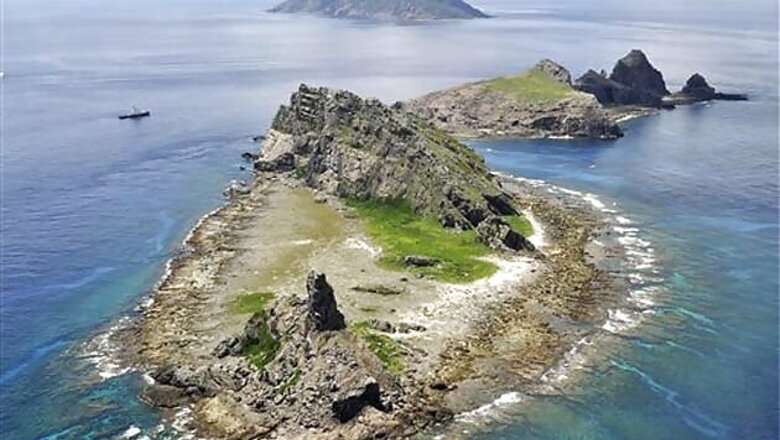
views
Singapore: The solitary islands in the East China Sea used to be the fancy of poets and fishermen. But today, these rocky outposts, once shrouded in anonymity, are at the heart of a tug of war churning the waters between Asia's two biggest economies. The cluster of islands, which Japan calls Senkaku and China, Diaoyu, have become the lightning rod for what is seen as the worst downslide in bilateral relations between the two Asian powers, in forty years.
"These are all very small islets that did not draw much attention until very recently," says KV Kesavan, an East Asia specialist at Observer Research Foundation in New Delhi. "What really matters right now is who is physically occupying these islets. It is a fact that China did not show any serious interest in the Senkakus until the late 1960s when it was speculated that the there were rich oil, gas and other mineral deposits in the seas around the islands."
The five uninhabited islands that float 400 kilometers off of Okinawa, are submerged in the conflicting historical legacies of China, Japan and Taiwan, (also a claimant), thus complicating the sovereignty issue of the isles. Japan pegs its ownership of the Senkaku to 1895, claiming the islands were terra nullius, or belonging to no one when it took control of them. Japan refutes Chinese claims that it seized the islands following its victory over China in 1895, under the treaty of Shimonoseki, which ended the Sino-Japanese war.
With Japan's surrender in the Second World War, these desolate islands acquired new owners. The Americans took military control of the Senkaku and Okinawa, transferring them back to Japan only in 1972. Experts say the US intentionally left the ownership issue ambiguous, not wishing to hurt a rapprochement with China under then US President Nixon.
Despite their close trade ties, the stormy exchange between China and Japan, the world's second and third largest economies continues to escalate.
China squarely rejects Japan's 19th century assertion of ownership. It traces its legitimacy over the Diaoyu back to the14th century, to the Ming and Qing dynasties, claiming Chinese envoys and traders discovered the islands during their maritime voyages. The Chinese still harbor deep resentment towards Japan's military past, accusing it of seizing the islands from China during its imperial expansion. Furnishing ancient maps to bolster its case, China states the islands undisputedly belong to them.
"Maps don't give you legal title," says Dr Ian Storey, Senior Fellow at the Institute of Southeast Asian Studies in Singapore. "You can show the territory on the map, but it won't hold in the court of law. Proximity doesn't give you sovereign title. It's effective and continuous administration, that does. Discovery can be taken into account but that's hard to prove."
The current intransigence over these islands underscores the importance of historical interpretation. With each country pegging its claim to a historical precedent, it makes a resolution to the problem intractable. While every nation has a fundamental right to its own version of history, experts say, there is also an urgent need to accommodate solutions that are acceptable to all.
Carlyle Thayer, a maritime expert at the University of New South Wales in Australia, says: "The sovereignty issue can only be solved by the states directly concerned, either through negotiations or international arbitration. Given the forces of domestic nationalism in all claimant states, and the "winner take all" nature of international arbitration, the questions of sovereignty is unlikely to be solved."
A similar saber rattling is reverberating across the South China Sea, making these busy sea-lanes choppier than usual. The theme is similar- a race for resources fueled by rising nationalism. Vietnam and China are fighting over the Paracel islands that lie southeast of China's Hainan Island. Further south, high tides are battering the Spratlys, contested by China, Taiwan, Vietnam, Malaysia and the Philippines.
"The Chinese consider this their old turf, going back to the days of the Middle Kingdom," explains Dr. John Blaxland, a military historian and Asian security expert in Canberra. "It's a turf they feel they have some prerogative over, and that these relatively young, colonially established post-European phenomenon, namely the states of Southeast Asia, have a secondary order of legitimacy."
To assert its ownership, China is using the 9-dash line, a map that demarcates its control over more than eighty per cent of the South China Sea, including the Paracel and Spratly islands. This line has riled Southeast Asian nations, who say it violates international law, including the United Nations Convention on the Law of the Sea, or UNCLOS.
"China is playing with a very strong set of cards in its hand and even though people question the likelihood of them winning any legal battle, arguably they don't have to," explains Dr. Blaxland. "If they play their cards right they can assert enough authority to get their way and do it in a de facto manner."
Meanwhile, the Philippines is protesting Chinese assertions over the Scarborough Shoal and has taken the dispute to a UNCLOS tribunal. A move it says it was forced to take after peaceful negotiations failed.
"The Chinese claim over the Scarborough Shoal is unlawful and illogical," says Carolina Hernandez, Director of the Institute for Strategic and Development studies in Manila. "The Scarborough Shoal is closest to the Philippines, nobody has ever claimed it except China. It has belonged to us all along. The Chinese claim that the Shoal was a traditional fishing ground for their fishermen since the Qing dynasty; that they would sail from Hainan Island to the Scarborough Shoal to fish- certainly a great distance in the old days. How can you believe such claims?"
While no one really knows the extent of oil and gas reserves in the South China Sea, estimates vary. The US Energy Information Administration (EIA) pegs it to around 30 billion barrels, while China estimates nearly 200 billion barrels exist, calling it the "new Persian Gulf".
Hungry for resources, China is therefore not likely to steer clear from these waters anytime soon. "Resource nationalism," explains Professor Thayer, "has trumped international law and common sense."
While no one expects the countries involved to go to war over the issue, the islands dispute has become a top priority in the region's security agenda.
"The growing frequency of incidents at sea involving warships, patrol boats, fishing trawlers raises the risk that an accidental clash at sea, triggered by misperception or miscalculation could escalate into a more serious crisis in which lives are lost and bilateral relations are pushed to the brink," explains Dr Storey.
Meanwhile, China is keeping a watchful eye on the United States deepening interest in Southeast Asia, a region with which China shares a flourishing business and economic partnership, and is its top trading partner. China is wary of President Barack Obama's 'rebalance' or "pivot" to the Asia Pacific region, a policy translated in Chinese as America's "return to Asia". China maintains it wants bilateral solutions with each of the claimants in the South China Sea, and is opposed to the so-called 'internationalization' of the issue, involving the United States.
"The Obama administration's 'rebalancing' moves portend a worrying trajectory for the Sino-American strategic relationship," says Dr Zhu Feng, Deputy Director of the School of International Studies at Peking University. Speaking at a conference in Singapore, he said, "diplomatically, the US has continually sought to keep China cornered and subdued with regards to the South China Sea by allying with Vietnam, opening new military base in Philippines and excluding China from the Trans Pacific Partnership." China, according to Dr Zhu, is feeling insecure by what it perceives as America's growing clout in Southeast Asia. ASEAN countries, he advises, should not alienate China by engaging deeper with the US.
In both the East and South China Seas, history and geography are inextricably linked. The region cannot escape the preponderance of the past, yet it cannot allow it to shadow the future.
The monsoons lashing Southeast Asia will recede in the coming weeks, but the powerful currents ripping through one of the world's most vital shipping arteries are unlikely to ease anytime soon. The potential bounty of undiscovered oil and gas reserves that lie deep underneath these waters will continue to test the peace and stability in the region, making it a potentially dangerous military flashpoint.
Ashwini Devare is a freelance journalist based in Singapore and a former reporter for BBC Asia.
















Comments
0 comment